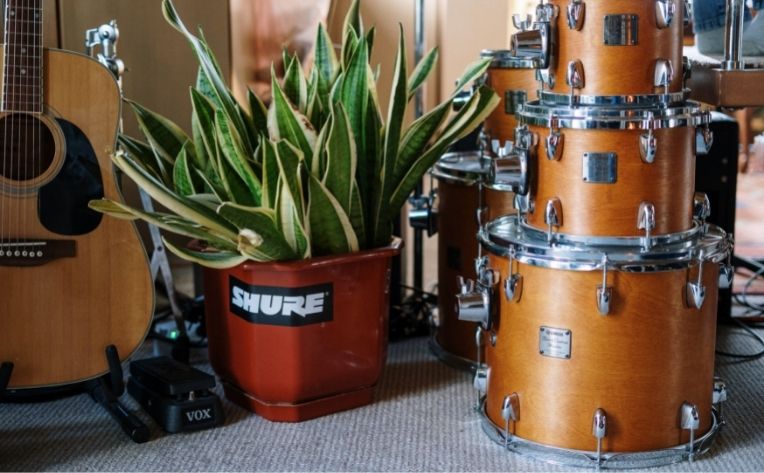
Tips for Soundproof Floors
Soundproofing is a way to stop noise from leaving or entering a space and it can be useful in many situations, other than just having an aspiring drummer as your neighbor. When considering soundproofing your floors, it is important to consider what type of noise you’re trying to stop: impact noise, airborne noise, or both. Impact noise is just what it sounds like—anything contacting your floor like the sound of footsteps, furniture moving or dropping or that really heavy cast-iron pan that’s been passed down for generations. A flooring material’s effectiveness against impact noise is measured by its Impact Insulation Class (IIC). Airborne or transmission noise covers pretty much all the other sounds that occur that aren’t something hitting a floor, like music, traffic, people talking or that corgi in desperate need of a bark collar. Different flooring material’s ability to absorb this type of sound is rated using the Noise Reduction Coefficient (NRC). Now that you know more about what soundproof floors are trying to limit, it’s time to think about where they are needed.
When planning which floors require the most soundproofing, you need to map out your home to see what is next to, above and below each room. In most homes, the answer to which room needs soundproof floors is obvious: kids’ bedrooms. The pitter-patter of little feet sounds nice in a poem, but not so much when you have to get up for work in the morning. In addition, if you look forward to that little bit of time you get each night between their bedtime and your own, you won’t want any noises waking them up.

But beyond the bedrooms, consider which rooms in your home produce the most noise. Are you an avid chef with pots and pans clanging constantly? Are you a cinephile watching in your very own home theater with surround sound? Do you have your own recording studio where you like to lay tracks down? After you’re done reviewing the noise that you produce, then you can also consider the noise that your neighbors produce. Once you have identified the rooms that need the most soundproofing, then it’s time to look into solutions.
Overall, additional surfaces are the best way to block noise because continuous flooring materials, like tile and hardwood, will always vibrate and transmit sound from one space to the next. But there are some flooring materials that stop sound better than others. The most well-known soundproof floors are made of cork. Cork combines beauty and durability with a noise-absorbency that can’t be matched by other everyday flooring materials. Porous cork floors are so good at absorbing sounds that they are widely used in recording studios.
Carpet is naturally one of the most soundproof flooring options on its own because the fibers can soften most noise. It’s also one of the least expensive options for effective soundproofing. But if you’re looking to buy new carpet, you can also add carpet padding to increase the effectiveness of the soundproofing. Carpet padding is placed underneath new carpeting and comes in a variety of sizes–the thicker the carpet cushion, the more soundproof it is.

If you already know you’ll be replacing the floors you’re looking into soundproofing, then a soundproof layer of underlayment is a great option. Underlayment is normally used to level out subfloors, but many types of underlayment can also help protect against moisture, provide cushioning and absorb noise. Just like carpet pads, underlayment’s soundproofing ability depends on the thickness, and it comes in thicknesses as thin as 2 mm.
Underlayments are available in many different materials and their effectiveness in stopping sound varies depending on their composition. Often you will find a version of underlayment designed specifically for soundproofing. It is called acoustic foam and comes in thicker sizes than normal underlayment to assist with soundproofing. If you’re looking for an eco-friendlier option, you can opt for felt underlayment. It’s made from recycled felt and is about four times heavier than the foam version, but with that weight comes better soundproofing and a higher price tag. They also make plywood underlayment, an acoustic underlayment made from recycled wood and even cement boards that can provide some soundproofing due to their weight.

The biggest catch with underlayment is that it can only be applied directly to a subfloor, which is most easily accessed when installing a new floor. Once the underlayment is adhered to the subfloor, your new flooring, whether it be luxury vinyl tile, laminate or hardwood can be installed on top.
The most effective ways to soundproof your floors often require professional help. That’s where your local Flooring America experts come in. They can review your needs and recommend everything you’ll need to get your project underway.
If you’re looking for a quick solution, interlocking floor mats are an easy way to soundproof your rooms without completely redoing your floors. They come in various styles and textures, easily lock together and fit right over the top of your existing floor. If you still like the look of your existing floor and don’t want to cover it completely, consider a throw rug or an area rug. Not only will area rugs help dampen noise, but they can also bring a pop of color and texture to your space. And just like with carpets, you can add rug pads underneath your rug for a boost in soundproofing.
Need Help Installing Floors in Your Home? Ask the Experts at Factory Flooring
What type of underlayment should you use? How many inches thick? How do you install it? And how do you avoid damaging your floors in the process?
When you work with Factory Flooring, you don’t have to worry about these questions. Our team of professional flooring installers will handle all the heavy lifting for you — literally. All you have to do is relax and enjoy the savings on your energy bill.
Need to get more flooring ideas first? Our design blog has dozens of articles to help you get started. Whenever you’re ready to tackle your insulation project, we’ll be here to help. Contact us online to get started, or call Factory Flooring at 469-583-7053






